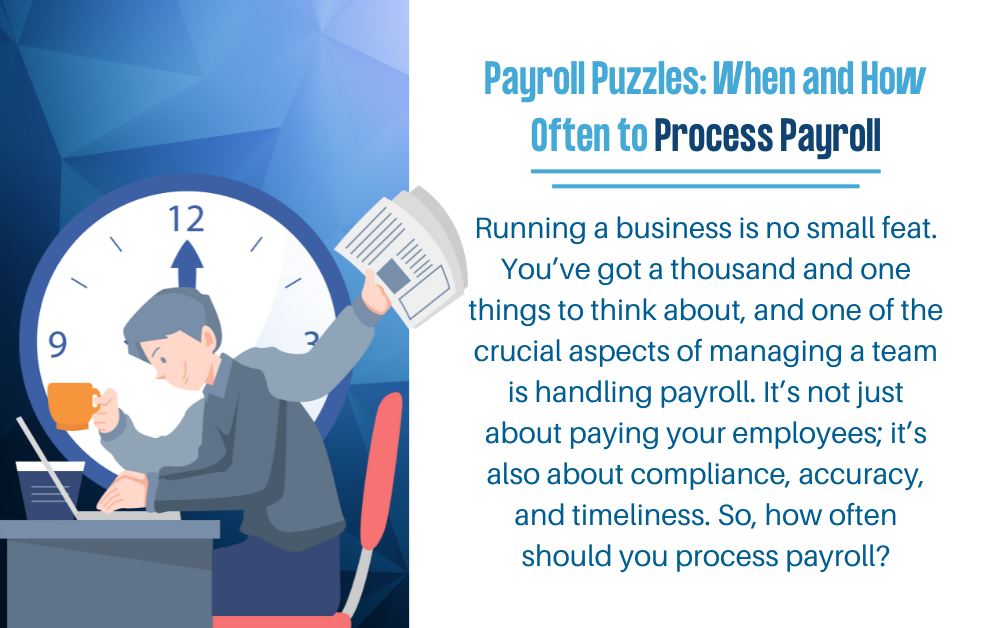Running a business is no small feat. You’ve got a thousand and one things to think about, and one of the crucial aspects of managing a team is handling payroll. It’s not just about paying your employees; it’s also about compliance, accuracy, and timeliness. So, how often should you process payroll? In this comprehensive guide, we’ll unravel the payroll puzzle to help you make an informed decision.
The Importance of Payroll Frequency
Before diving into the specifics of when and how often to process payroll, let’s take a moment to understand why payroll frequency matters.
1. Employee Satisfaction: Regular paychecks on a consistent schedule contribute to employee satisfaction and retention. Employees rely on their paychecks to meet their financial obligations, and delays or irregularities can lead to dissatisfaction.
2. Tax Compliance: Payroll taxes are a significant responsibility for employers. Processing payroll regularly ensures that you stay compliant with tax regulations and avoid penalties or audits.
3. Financial Planning: Having a clear payroll schedule helps with financial planning and budgeting for your business. It provides a predictable cash flow pattern, making it easier to manage your finances.
4. Productivity: Processing payroll can be time-consuming. Choosing the right frequency can help you strike a balance between administrative tasks and more strategic business activities.
Now that we’ve established the importance of payroll frequency, let’s explore the options available and which one might suit your business best.
Choosing the Right Payroll Frequency
1. Weekly Payroll:
- Pros:
- Provides employees with a consistent income flow.
- Ideal for hourly or part-time workers.
- Helps maintain a close watch on labor costs.
- Cons:
- Administrative overhead due to frequent processing.
- Increased chances of errors with more frequent runs.
Weekly payroll is suitable for businesses with a large number of hourly or part-time employees, such as retail or restaurants, where labor costs need to be closely monitored.
2. Biweekly Payroll
- Pros:
- Strikes a balance between regularity and administrative ease.
- A popular choice among many businesses.
- Simplifies overtime calculations.
- Cons:
- May not align with all monthly financial cycles.
- Slightly higher risk of payroll discrepancies if not managed carefully.
Biweekly payroll is a middle-ground option that works well for businesses with a mix of salaried and hourly employees. It provides some flexibility in scheduling while maintaining a regular pay cycle.
3. Semimonthly Payroll
- Pros:
- Aligns with monthly financial cycles.
- Ideal for salaried employees.
- Simplifies record-keeping.
- Cons:
- Can result in varying numbers of workdays between paychecks.
- Overtime calculations can be complex.
Semimonthly payroll is often chosen by businesses that have a significant number of salaried employees and want payroll to align neatly with their monthly financial cycles.
4. Monthly Payroll
- Pros:
- Minimal administrative burden.
- Suitable for businesses with salaried employees.
- Simplifies payroll processing.
- Cons:
- Longer time between paychecks, which may not suit all employees.
- Requires effective budgeting to meet employee financial needs.
Monthly payroll is a straightforward and cost-effective choice, especially for businesses with a smaller workforce or a majority of salaried employees.
Factors to Consider
Now that you have an overview of the available payroll frequencies, consider the following factors when making your decision:
1. Your Workforce: The composition of your workforce matters. If you have a mix of salaried and hourly employees, you may need to choose a frequency that accommodates both.
2. Cash Flow: Assess your business’s cash flow situation. Some payroll frequencies may require you to have more cash on hand at specific times.
3. Administrative Capacity: Consider your administrative capabilities. More frequent payroll processing requires more resources and can be error-prone if not managed efficiently.
4. Employee Preferences: Seek input from your employees. Their preferences can be valuable in determining the best payroll frequency for your team.
5. Compliance Requirements: Review federal, state, and local labor laws. Some jurisdictions have specific rules regarding payroll frequency.
Introducing BCM Payroll: Your Payroll Partner
While choosing the right payroll frequency is a critical decision, the good news is that you don’t have to handle it all on your own. BCM Payroll, the leading payroll company in South Central Pennsylvania and Northern Maryland, is here to support your company.
Our team understands the intricacies of payroll processing and compliance, and we can tailor a solution that meets your unique needs. By partnering with BCM Payroll, you can:
- Ensure accurate and timely payroll processing.
- Stay compliant with all tax regulations.
- Free up your time to focus on growing your business.
- Provide your employees with a reliable and satisfying payroll experience.
Don’t let payroll puzzles stress you out. Let BCM Payroll handle it for you, so you can concentrate on expanding your business and increasing your bottom line.
Choose BCM Payroll for Payroll Peace of Mind
The question, “How often should I process payroll?” has no one-size-fits-all answer. It depends on your business’s unique circumstances, including your workforce, financial situation, and compliance requirements. The key is to make an informed decision that aligns with your business goals.
If you’re ready to simplify your payroll process and experience the benefits of accurate and efficient payroll management, BCM Payroll is your trusted partner. Contact us today to learn more about how we can support your payroll needs and help your business thrive.
In the world of business, every piece of the puzzle counts. Let BCM Payroll handle the payroll piece while you focus on expanding your business and achieving your goals.

